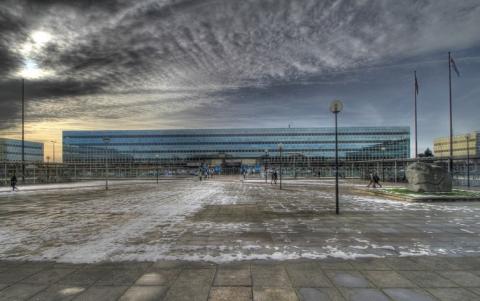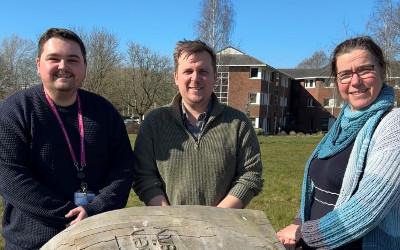You are here
- Home
- Milton Keynes is bidding to be 2023 Capital of Culture – it should be taken seriously
Milton Keynes is bidding to be 2023 Capital of Culture – it should be taken seriously

The British city of Milton Keynes is probably not the most obvious contender for the title of 2023 European Capital of Culture. It hasn’t exactly got a reputation for being a cultural hot spot: jokes about the blandness of Milton Keynes are entrenched in the popular imagination.
In his travel notes, popular writer Bill Bryson began by saying “I didn’t hate Milton Keynes immediately” and ended with a plea for the government to order its evacuation in favour of “real cities”. Author JG Ballard’s cleverer barb: “I always suspected that eternity would look like Milton Keynes”, wasn’t meant as a complement either.
Even the local tourism body, Destination MK, resorted to switching the negatives in their latest campaign, to challenge people’s preconceptions about the place.
 Destination MK: turning things around. DestinationMK, Author provided
Destination MK: turning things around. DestinationMK, Author provided
But as researchers in sociology and design who live and work in the city, we think there’s a case to be made for Milton Keynes. It was one of the last “new towns” to be built in the 1960s and as such it represents the political commitment to social justice and mobility which emerged at the end of World War II. This makes it a part of the same social democratic settlement which produced the National Health Service and the Open University.
Because it is new, Milton Keynes doesn’t have the long history of well-funded town hall bureaucracies and city benefactors, which help to create the infrastructures of “high culture” – the galleries, theatres and concert halls. But this shouldn’t knock it out of the running – in fact, it’s one of the reasons that its bid should be taken seriously.
Cultural or corporate?
Milton Keynes Council decided to bid for European Capital of Culture back in July 2015. Since then, a steering group of business, arts and civic and community leaders have held a series of public meetings to shape the bid. At one of these meetings with local artists, the debate circled around how to extend the city’s cultural reach, explore its diversity and improve its reputation.
Many lamented that the early efforts of the Milton Keynes Development Corporation to build the town around the unique artefacts, architecture, archaeology and people that were here first have been abandoned in recent years. Instead there is a Nandos. Then another Nandos. And another.
 It wasn’t supposed to be this way. David (MK), CC BY-NC
It wasn’t supposed to be this way. David (MK), CC BY-NC
The dominance of global mega-brands in the city’s retail centre is hardly unique to Milton Keynes. It is, though, one of the glorious paradoxes of this place, that locals worry a lot about these things. They worry precisely because Milton Keynes wasn’t an accident – it was built with particular aims in mind. It started, just like the Open University that is also based there, as a means to achieving collective, social democratic ends.
Yet in order to survive, both Milton Keynes and the Open University have had to adjust their strategies in response to different government policies over the decades. First there was the monetarist economic theory that came with Thatcherism which prompted a cutback on civic planning and social housing in favour of market-driven individualism. More recently, the government has led a swing toward the principles of capital-driven digital governance, promoting a focus on development in smart cities, apps and self-driving cars.
 The Open University: changing with the times. The Open University/Flickr, CC BY-NC-ND
The Open University: changing with the times. The Open University/Flickr, CC BY-NC-ND
These changes from one set of priorities to another are feverishly contested by local communities and have been deeply painful for residents, university staff and students. They are the local consequences of the slow decline of government planning, regulation and international cooperation which have also been manifest in global developments such as the 2008 Global Financial Crisis, the refugee crisis and Britain’s decision to leave the EU.
The city is culture
These political, economic, social and personal catastrophes are integral to understanding culture in a meaningful way. As the late Stuart Hall, formerly professor of sociology at The Open University, argued in his opening editorial to the New Left Review in 1960; the experience of culture in all its forms is “directly relevant to the imaginative resistance of people who have to live within capitalism – the growing points of social discontent, the projections of deeply felt needs”. In other words, culture is everywhere; in the commodities people buy, in the laws that govern corporations, in the ways people develop their identities.
Rather than looking at the culture that takes place in the city, Hall showed that the real task is to understand the city itself as culture. Milton Keynes was meant to be different: it is, as the Capital of Culture bid proposes, “different by design” – and yet that design has come to represent many of the battles between capitalism and culture which are taking place in cities across the world.
 The city of Milton Keynes is then, a kind of petri dish, where the sometimes discomforting mixtures of art and commerce, culture and financial capital are laid bare for all to see and experience. As such, it is a powerful guide to the ways that capital is always cultural, and a reminder that culture is always capitalised.
The city of Milton Keynes is then, a kind of petri dish, where the sometimes discomforting mixtures of art and commerce, culture and financial capital are laid bare for all to see and experience. As such, it is a powerful guide to the ways that capital is always cultural, and a reminder that culture is always capitalised.
Liz McFall, Head of Sociology, The Open University and Darren Umney, Visiting Research Fellow in Design, The Open University.
This article was originally published on The Conversation. Read the original article.
Quarterly Review of Research
Read our Quarterly Review of Research to learn about our latest quality academic output.

Contact our news team
For all out of hours enquiries, please telephone +44 (0)7901 515891
Contact details